Welcome to the third article in the article series The Skills of Netrunner. I have purposefully left out discussion of decks so far, as I feel this type of discussion often dominates conversations, and has the risk of diverting from actually improving at the game. This is my opinion, but I feel that you as a player will fall into a trap if you focus on deck choice and card choices when you are still making basic game-mistakes.
This time we will discuss deck choices and deck-types, and go through what you should consider when choosing your deck, with some special comments for a starting player as different from a more experienced player.
When slotting cards in a deck you hopefully have an idea in mind. I believe decks can be described based on their core game plan and auxiliary or secondary game plans or lines of play. I also believe these are best described using three of the skills we discussed in the first article. You will also understand shortly why efficiency is not part of this triad. On the extremes, decks can be described by what they do to win. I will use extreme examples to explain the concepts, but all decks have a measure of all types in them.
Strategic Decks
A 100% strategic deck has a single gameplan that it aims to execute regardless of matchup or boardstate. It is called strategic because the strategy you choose when playing is very much built in to the deck, and the plan to win is centered around the core mechanisms of the deck. Combo-decks and denial decks are further towards this end than any other end. They usually include counter-cards to counter-cards simply because their core game plan is so important for them.
On the corp side:
- CI Shutdown Combo – https://netrunnerdb.com/en/decklist/39013/gotta-go-fast-2016-store-championship-1st-place-
- NEH Fastro – https://netrunnerdb.com/en/decklist/36993/russian-neh-post-mwl2-
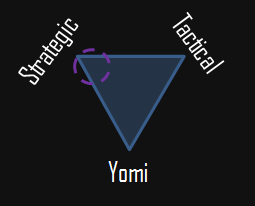
- IG Prison Kill – https://netrunnerdb.com/en/decklist/36997/dan-d-argenio-s-hinky-ig-1st-place-gencon-16-
On the runner side:
- DLR Decks – https://netrunnerdb.com/en/decklist/38733/minh-maxx-worlds-2016-runner-up-
- Eater/Keyhole Anarchs – https://netrunnerdb.com/en/decklist/14503/slysquids-mother-f-deck-store-championship-winner-
- DDos+False Echo shapers – https://netrunnerdb.com/en/decklist/38817/dyper-v3-25-top-16-at-worlds-2016-
If your strengths are perfecting a certain play-style and you enjoy a strong core game plan that creates inevitability for the opponent, then look into highly strategic decks.
The weaknesses of strategic decks are that they are meta-dependent. You will face a wide variety of matchups where you will have difficulty executing your game plan. Counter-cards will be difficult for you to handle, and you will lock your skills into a very specific deck and strategy if you learn the game with this type of deck.
Tactical Decks
A 100% tactical deck is a deck that maximizes flexibility. A tactical deck usually does not have a strong core game plan (differing from the base plan in the game, score agendas!) but aims to have many different ways in which to do this. A tactical deck plays the opponent’s deck more than its own sometimes, and it is more important to understand the opponent’s deck and strategy to be able to disrupt it. A tactical deck can include counter-cards, but more often include a range of generally useful cards to disrupt and take advantage of oppurtunities.
On the corp side:
- Info-Refinery SYNC – https://netrunnerdb.com/en/decklist/34771/info-refinery-vegas-regional-1st-place-
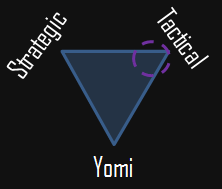
- Titan ‘Fascism’ – https://netrunnerdb.com/en/decklist/24824/fascism-three-ways-to-win
On the runner side:
- Silver Bullet Kate – https://netrunnerdb.com/en/decklist/38049/silver-bullet-kate-1st-place-spanish-nationals
- My own Shock Tactics Leela – https://netrunnerdb.com/en/decklist/37996/shock-tactics-nordic-nationals-3rd-5-2
- Hate Bear Whizz – https://netrunnerdb.com/en/decklist/38801/hate-bear-3rd-4th-8th-16th-19th-26th-at-worlds-
If your strengths are analysing opponents play and disrupting their plan, as well as adaptability and choosing the right move with a range of options, look into these decks.
The weaknesses of these decks are that you not only have to learn your deck, you have to learn what to do with it versus multiple opponents. They take time to get good with and tend to punish mistakes.
Yomi Decks
A 100% Yomi deck would concentrate purely on bluffing and exploiting the opponent’s predictability. A Yomi deck needs to have exceptionally strong options to present the opponent with very difficult choices. They then require the pilot to make the opponent make the wrong choice, getting away with doing things that no other deck can do with unparalleled efficiency. To say that a Yomi deck exploits fear is not completely off. They must be able to present the opponent with possible ‘forks’ and what-if scenarios so tend to pack multiple different such options.
On the corp side:
- My own Bag of Tricks PE – https://netrunnerdb.com/en/decklist/37995/bag-of-tricks-v-nordic-nationals-3rd-5-2
- BigBoy’s Battle of Wits – https://netrunnerdb.com/en/decklist/37733/bigboy-s-battle-of-wits
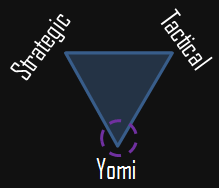
- Seamusmodernism – https://netrunnerdb.com/en/decklist/35079/seamusmodernism-v3-1st-place-scottish-regional-undefeated-
On the runner side:
- Actually, i find it very difficult to find good examples. While runners do play Yomi, the options are usually dictated by the corp. Yomi requires presenting hidden information options or luring the opponent to act in a detrimental way, which runners have less opportunities to do. I’d say singletons of powerful run-events are the closest you get.
If your strengths are staying calm under pressure, know how to psychologically exploit your opponent, and enjoy taking risky gambles, then look into Yomi decks as your corp.
The weaknesses of Yomi decks are that they are very interactive. To win you have to take large risks, which lead to inherently inconsistent games. You need to be able to find consistency in opponent’s play-patterns to win. If your opponent is unpredictable, you will have a hard time.
Midrange decks
While we have discussed the extremes, and I have tried to find the most extreme examples, many decks fall into what is called midrange. This means that they have a good base strategy, a bunch of tactical options to make good moves and some Yomi options when a powerful out is needed.
The most midrangy decks are usually what is called ‘basic Netrunner’ and is what most new players will experience from the core-set. They all vary a lot, but make up the broad range of decks. They favour good cards more than combos.
On the corp-side:
- Jammy HB – https://netrunnerdb.com/en/decklist/37580/jammy-rushy-hb-london-babw-first-place
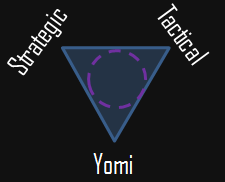
- NBN CTM – https://netrunnerdb.com/en/decklist/38845/snekbite-1st-and-6th-worlds-2016
On the runner-side:
- Hate Bear Whizz – https://netrunnerdb.com/en/decklist/38801/hate-bear-3rd-4th-8th-16th-19th-26th-at-worlds-
- Andy Strikes Back – https://netrunnerdb.com/en/decklist/38844/andy-strikes-back-21st-worlds-3rd-icebreaker-
- Pitchfork Hayley – https://netrunnerdb.com/en/decklist/32536/pitchfork-sure-gamble-is-a-crutch-
If you want to learn the game without closing yourself off to parts of it, and if you value both flexibility in play and meta-flexibility, go with midrange decks. They are arguably among the more fun to play and play against as well.
The weakness of midrange decks is harder to nail down; it depends on the meta and opponent. Sometimes they lose to strong strategic gameplans, sometimes they are poorly meta-adapted. I would argue they have few weaknesses and are a good base-strategy.
Power
Cards in Netrunner in general do an impressive job at being balanced card-by-card more than in most card games. There are outliers, but I would guess that half the printed cards see play as the meta varies, which is quite fantastic.
There is however better and worse ways of putting those cards together, and deck-building in Netrunner is hard. It is so hard in fact that many competitive players rarely start new concepts from scratch, but instead wait and copy the work of others, since the testing takes a lot of time. Then we thankfully do have good players who enjoy and excel at breaking the meta with new concepts!
Decks in a healthy meta have a rock-paper-scissors relationship to each-other, especially strategic decks, but there is definitely a more objective power-level that can be attributed to decks that have especially strong synergies or flexibility.
Part of decks power-level comes from good cards. For sure some cards are simply powerful and flexible (looking at you Astroscript >.>). These will of course contribute to your deck’s strength in numbers.
Another part of its power-level is powerful synergies between cards. As you might have heard, cards that are already good and synergise on top of that contribute greatly to power-level. Combinations of cards that provide you with good game plans or outs like ‘Breaking News + Exchange of Information’ are examples of this.
Third, a deck needs to be able to play efficiently. Here we come to the fourth skill of Netrunner that you have already read about. This means that the deck has enough economy and in the correct combinations to allow efficient play. This includes acquiring resources (such as credits or cards) as well as converting between resources. It also includes things like the quality of breakers (cost-to-break) as well as quality of ICE (cost-to-break).
Another honourable mention here is consistency. While not integral to all powerful decks, most of them want to be able to do a thing when they need to do it. Consistency can be replaced by strong synergies between cards and multiple useful silver-bullets which can make up for the lack of it.
A powerful deck is simply a deck that, played well against an equally skilled player, beats other decks most of the time.
A suboptimal deck is a deck where you find yourself unable to come up with a good strategy in most matchups or frequently fall behind in economy, for example needing to click for credits frequently.
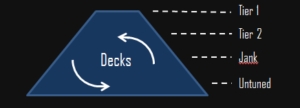
The majority of decks are not top power-level, and things continually change.
Complexity
Decks very much vary in how difficult they are to pick up and play. This is important for several reasons, but first I have to make the case that.. this is the case. Arguably the ‘skills of Netrunner’ that I have listed in a previous article is what I consider most of the skill-space in the game. Thus, if you only need to utilize one or two of them, or if you reduce the decision-space within them a lot, then it is easier to choose correctly.
Complexity is the learning-curve of playing a deck to its highest effectiveness. If the deck is very simple to play to its fullest potential in a few games it is not very complex. If the deck takes many games, experience of evaluating many situations and good meta-knowledge to play well it is complex. As a new player you ideally want to play a deck that is not too complex, since even though it might be powerful (or ‘high-tier’) you may need to master certain skills before you can play it effectively.
On the other hand, if you choose a deck that is too simple it might cause you to not learn important aspects of the game, which may lock you into that type of deck if you have trouble accepting that you must start losing a lot when you want to try new things.
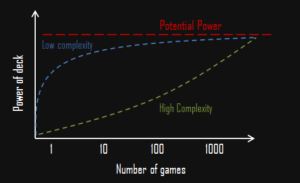
The difference between power and complexity.
Silver bullets and ‘Crutches’
I have a last topic related to decks that I want to bring up. The use of specific cards to solve problems in the game is somewhat controversial. Some players like to anticipate the meta to be able to slot counter-cards, others prefer to learn to play around problems. You should certainly consider silver bullets, or more general counter-cards when choosing (or tuning) your deck but the cost of having them take up slots is high and you should only choose ones that either shore up your decks weaknesses or are very useful in the current meta.
Further I will argue that as a new or new-ish player you should consider cards that are often bashed for being ‘crutches’ at higher levels of play like expose effects or hard counters like Plascrete Carapace over soft counters like Sports Hopper. Some cards are more useful when you have less ability to analyse the meta or your opponent. For a player who do not know most of the important ICE (and it takes a while to get there) things like expose are vastly more valuable than to a player who can predict ICE based on board state and opponent!
Some might argue that as a new player you should just pick up a complex high-tier deck and learn it all the hard way. I disagree. As a new player you should aim to maximize learning from each game, and by being better able to compete you will learn more, faster. You will also get pause to learn the basics before you try to do things like anticipate the odds he drew a Scorched Earth so that you have to pre-emptively pop your Sports Hopper. For most of us, losing also saps some energy and it might be better to prevent some of these losses to ensure the learning stays as fun as possible.
This goes even further; if you notice that you have a weakness in one of the four skills, or make a certain type of mistake very often, a specific card may be more powerful for you than it is for other players. We all have our strengths and weaknesses. One of my main weaknesses is my tendency to take risks when I don’t need to. I really should include more recursion, but since I refuse to learn, I play a single Corroder 😉
If you find yourself getting Hard-Hitting News’d often, try playing a deck or cards that are less vulnerable to tagging. If you find yourself facechecking nasty ICE often, try playing Snitch decks or include Deuce’s Wild. Play to your strengths, but do not switch decks to often! This will bump you down the learning curve of your decks each time.
The power-level of some cards or decks are not objectively the same for different players. This is why you will both choose and tune decks just based on your preference and play style. Don’t listen to much to what others say is good if they don’t have a good argument. Follow your gut, and test it out for yourself!
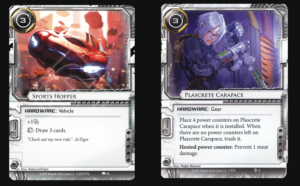
Which one is the right choice for you?
Summary
We have looked at a possible way to classify decks and make communication about decks easier. I have hopefully provided you with enough examples to find your way in the jungle of deck-choices and some guidance in where you want to go.
We can also quite quickly place a certain deck on the scales I have described below, even though no single person likely has the correct opinion on all possible decks I believe that collectively we can rate most decks correctly on these scales.
Also remember that the actual power level of a deck is not only dependent on the cards in it, but in which hands it is placed. A strategic player may not do well with a Yomi deck. A new player may do better with a deck with expose effects, a clear game plan, and more recursion to buffer play mistakes. A mainly strategic player will have a hard tiem playing agressive Criminal, while a mainly tactical player will sacrifice long/term tempo to disrupt the opponent, even while playing shaper (hello there!).
An experienced player may do better replacing expose effects with meta-specific counters such as Film Critic and Clot. If you know what to expect from your opponent, counter cards make more sense. If you are learning the game they will not be as useful, and just give unnecessary complexity while learning the important skills. Thus I believe that you should start in the middle with mid-range decks, and as you learn the game steer towards wherever your strengths lie.
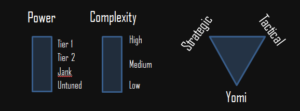
This concludes the third article. Next time we will finally dig into the subject of the learning state and how to consistently improve as a player.




